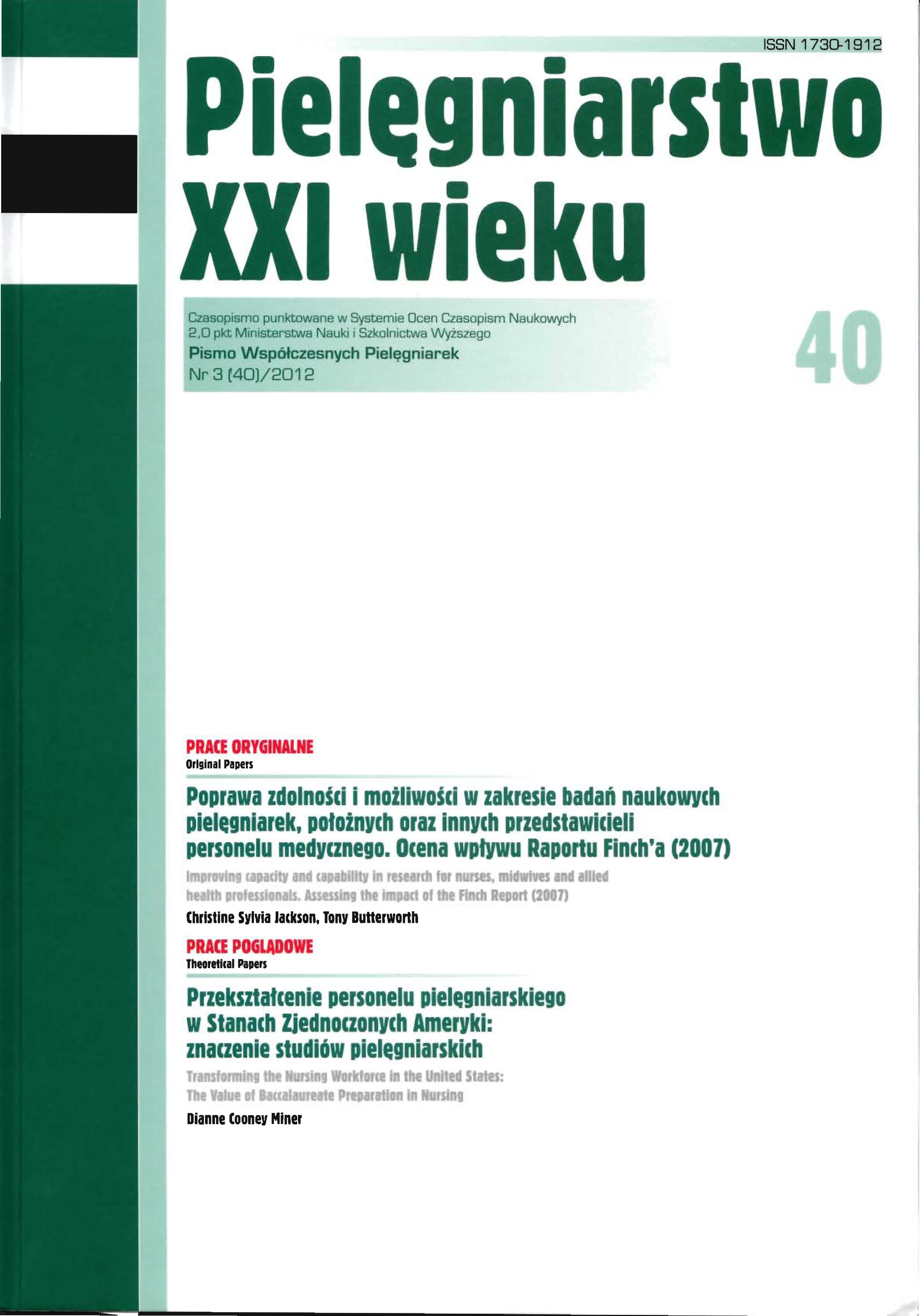Nurses’ expectations towards postgraduate education
Keywords:
expectations, postgraduate education, nursesAbstract
NURSES’ EXPECTATIONS TOWARDS POSTGRADUATE EDUCATION
Introduction. Progressing professionalization of nursing requires constant education to expand and update one’s professional knowledge. This statutory duty can be met thanks to the constantly broadened range of forms of education and professional training, the latter being specialization, qualification, in-service and specialist trainings. Furthermore, nurses turned out to be particularly interested in undertaking training, so the nature of their expectations towards postgraduate education is worth investigating.
Aim. The aim of this research is to identify nurses’ expectations towards postgraduate education.
Material and method. An auditorium questionnaire survey was conducted in 2012 among 102 nurses who participated in professional training delivered by the Centre of Postgraduate Education, Medical University of Lublin.
Results. The main benefits for those who undertake postgraduate training refer to opportunity to expand one’s specialist knowledge as well as one’s own satisfaction with higher qualifications. The surveyed noted that sense of self- and job security is also a significant factor, though they were ambiguous when identifying benefits for the whole professional group of nurses. The respondents mentioned increased professional self-reliance, better quality of nursing, as well as growing professionalization of nursing and raised job prestige among the society. They expect that becoming a specialist will result in a pay rise and greater professional independence, the latter meaning more active participation in the decision-making process.
Conclusions: Nurses who undertake postgraduate education expect, above all, extension of professional knowledge and consequently increase of professional independence. It is worth noting that nurses expect higher qualifications to influence their salary.
References
1. Cisoń-Apanasewicz A, i wsp. Opinie pielęgniarek na temat kształcenia podyplomowego. Problemy Pielęgniarstwa. 2009; 17 (1):32-37.
2. Nowik M. Wybrane zmiany w procesie kształcenia i doskonalenia zawodowego pielęgniarek. Pielęgniarstwo XXI wieku. 2005; 4 (13): 111-115.
3. Report of the Post-registration Nursing and Midwifery Education Reviev Group. Changing practise to suport service delivery. Health Service Executive. Dublin 2008.
4. Ustawa o zawodach pielęgniarki i położnej. Dz.U.11.174.1039.
5. Rozporządzenie Ministra Zdrowia z dnia 30 maja 2007 roku w sprawie wykazu dziedzin pielęgniarstwa oraz dziedzin mających zastosowanie w ochronie zdrowia, w których może być prowadzona specjalizacja i kursy kwalifikacyjne oraz ramowych programów specjalizacji dla pielęgniarek i położnych. Dz.U.07.102.708.
6. Szlendak B. Kształcenie podyplomowe w latach 2004–2008. Magazyn Pielęgniarki i Położnej. 2009; 5: 8.
7. Kadłubowska M, i wsp. Podnoszenie kwalifikacji zawodowych w opinii studentów licencjackich studiów pomostowych. Problemy Pielęgniarstwa. 2010; 18 (2): 124–128
8. Czerniak J, Cieśla D. Ścieżki rozwoju zawodowego. Magazyn Pielęgniarki i Położnej. 2009; 3: 10–11.
9. Simpson BJ, Holroyd E. Developing a Framework for the future: a qualitative perspective on postgraduate nursing education in Hong Kong. Nurse Education Today. 1997; 17: 370-375.
10. Barribal KL, While AE, Norman IJ. Continuing proffesional education for qualified nurses, a view of the literature. Journal of Advanced Nursing. 1992; 17: 1129-1140.
11. Kieczka K. Opieka profesjonalna i zakres kompetencji pielęgniarek w Polsce w świetle prawa w ostatnim stuleciu. Pielęgniarstwo XXI wieku. 2010; 1-2(30-31): 81-86.
12. Bidzińska E, Sobczak ED, Rakowska KA. Motywy podwyższania wykształcenia przez pielęgniarki Wojewódzkiego Szpitala Zespolonego w Elblągu. Problemy Pielęgniarstwa. 2007; 15 (2,3): 197-202.
13. Jurczak A, i wsp. Motywy podejmowania kształcenia podyplomowego przez położne województwa zachodniopomorskiego. Perinatologia, Neonatologia i Ginekologia. 2012; 5(1) : 39-42.
14. Watkins D. Motivation and expectations of German and British nurses embarking on a Masters programme. Nurse Education Today. 2011; 31: 31-35.
15. Gallagher L. Continuing education in nursing: A concept analysis. Nurse Education Today. 2007; 27: 466-473.
16. Tomaszewska M, i wsp. Możliwości doskonalenia zawodowego pielęgniarek – potrzeby a rzeczywistość. Problemy Pielęgniarstwa. 2008; 16 (1,2): 40-47.
17. Wódz K. Praca socjalna w środowisku zamieszkania. Katowice: Wyd. Śląsk;1998.
18. Stępień J. Socjologia pracy i zawodu. Poznań: Wyd. AR;. 2001.
19. Abramczyk A. Status społeczny i zawodowy pielęgniarki w Polsce i wybranych krajach europejskich. Zeszyt Naukowy Wyższej Szkoły Medycznej LZDZ w Legnicy. 2011; 1 (10): 11-27.
20. CBOS. Prestiż zawodów. Komunikat z badań. Warszawa 2009.
21. CBOS. Prestiż zawodów. Komunikat z badań. Warszawa 1999.
Downloads
Published
Issue
Section
License
Copyright (c) 2012 Anita Majchrowska, Renata Bogusz (Autor)

This work is licensed under a Creative Commons Attribution 4.0 International License.




